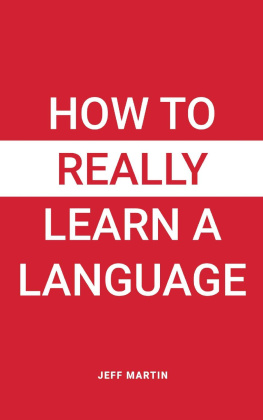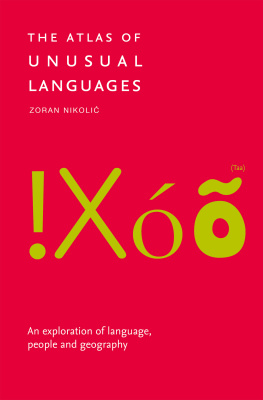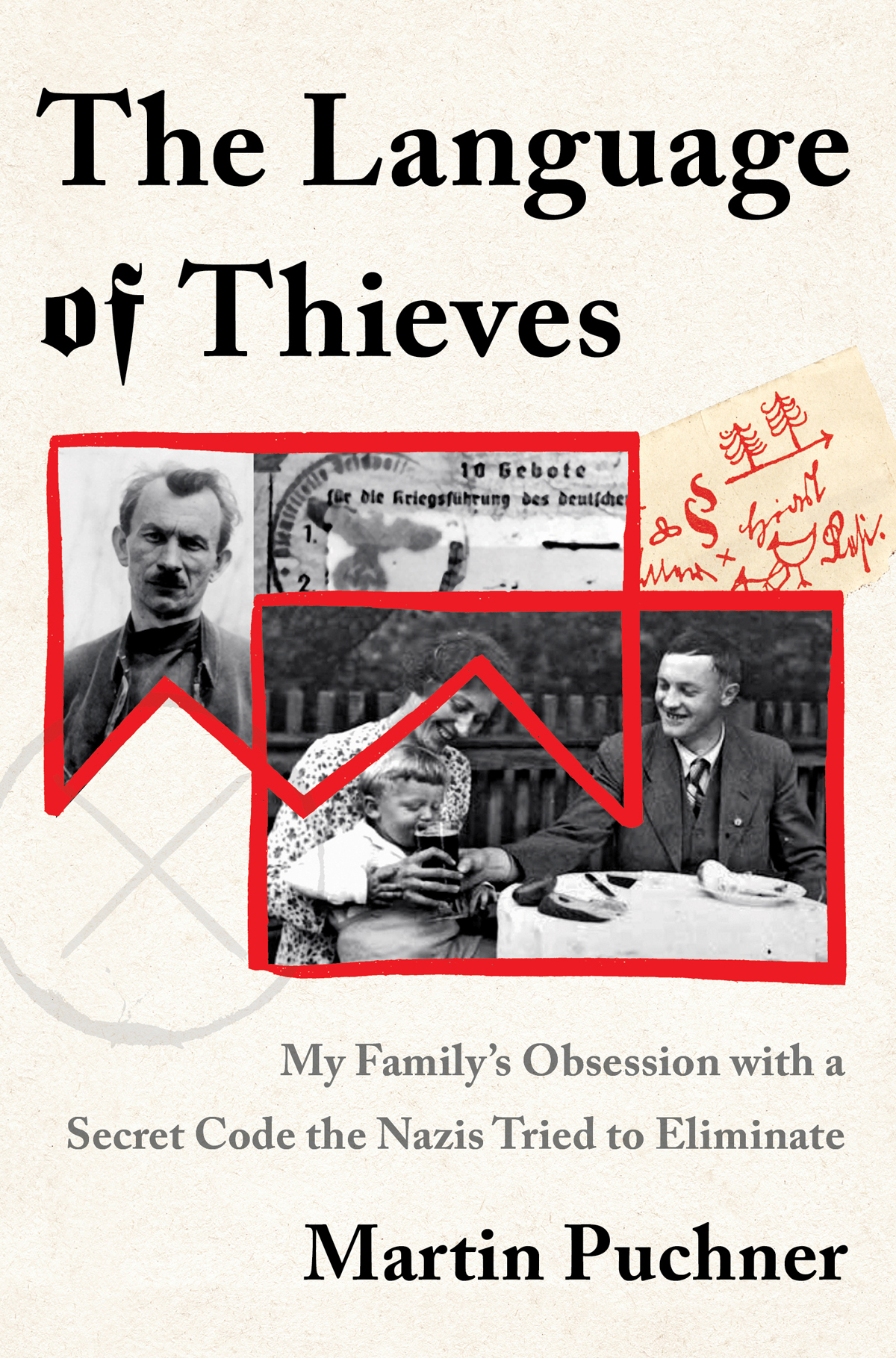Contents
Guide
Page List

THE
LANGUAGE
of
THIEVES

My Familys Obsession
with a Secret Code
the Nazis Tried to Eliminate
Martin Puchner


In memory of my father.
Contents
THE
LANGUAGE
OF
THIEVES


They appeared out of nowhere. Strange figures, dressed in long coats that had lost their original colors, bags slung across their backs. When it rained, they smelled, and my mother wouldnt let them inside the house. I know what you want. Wait. Ill be right back. I hid behind her for protection. Lingering near the door, I would hear noises from the kitchen, my mother fixing open-faced sandwiches. Plenty of butter and cold cuts, she knew how they liked it. She would return carrying a plate and a glass of water: Here. While they ate, she remained standing on the threshold, guarding the house, trying to make conversation. The men mostly stared at the food as they ate, avoiding her eye. I had trouble understanding them because they spoke a strange dialect, mixed with words I didnt know. When they had finished, my mother would take the empty plate from their hands and close the door, relieved that the encounter was over. I would run to the window to catch a final glimpse of these men as they disappeared around the corner.
Who are they?
They dont have a home. Were giving them something to eat.
Not very helpful; that much I had observed. I wanted to know why: why didnt they have a home; why were we giving them something to eat; and why did they have such a strange way of talking?
It was the early seventies, I was a few years old, and we were renting a small row house in Nuremberg, Germany, in a quiet part of town. Most of the modest houses had been built in the 1950s because Nuremberg was carpet-bombed during the war and rebuilt cheaply and haphazardly afterward. Despite its towering castle and medieval center, Nuremberg was a manufacturing town with a large working class, supplemented by an influx of foreign workers from Italy, Greece, and Turkey. Some lived on the other side of a park near us, and after I was beaten up by a small group of somewhat older boysnot too badly, reallymy mother told me to stay away from them and not stray too far from our own, safer, part of town.
How did those mysterious men find their way to our house, as if guided by a secret hand? Later, my father taught me some of their words. A barn was a stinker, prison was schul (school), and the entire language was called Rotwelsch. Welsch: had these men come all the way from Wales? Rot, in German, meant red. Red-Welsh? The whole thing sounded as if a demon had gotten hold of words and played around with them, twisting their meanings for sheer fun. I asked my father, sensing that he might tell me more about these men and their language. They are travelers, he said. I didnt understand. Where are they going? They are people of the road, escaping to nowhere. It was a strange expression I didnt grasp, but it stayed with me.
My uncle figured out why these escape artists kept showing up at our house when he found a sign discreetly carved into the foundation stone, a cross with a circle around it. He explained that it meant that there was bread to be had here (only they didnt call it bread; they called it lechem). There were dozens of such signs. A hammer meant that you had to work in exchange for food; a cat, that an old woman was living on her own. Vertical bars warned of aggressive policemen who would put you in school.
I was delighted. I couldnt read or write yet, to my shame, and wouldnt learn to until I was almost nine years old, because of dyslexia. My Es pointed backward, my Ls were upside down, individual letters kept getting mixed up; when I tried to read, my eyes darted back and forth, trying to line up words in the right order. It was hopeless. But now my uncle was showing me different types of signs that I could decipher with ease. Sensing my interest, he would draw these signs on pieces of paper, teaching me a good dozen of them.
I learned that travelers left these signs for one another out of solidarity, telling others where to beg, which houses to approach, and which to avoid. They were making the road navigable for their ilk. There were other signs, more complicated, signatures of travelers who wished to make their presence known and who told little stories about what they were up to.
For me, these signs pointed to an underground of traveling people, hidden away from view. In addition to our world, the world of houses and kindergartens (and alphabets), there was a second world inhabited by people of the road, without houses or kindergartens, and with a completely different way of speaking and writing.
The signs were called zinken, a word derived from the Latin signum, and they turned the world, my world, into a labyrinth of mysterious symbolsand also into a puzzle I wanted to solve, a giant treasure hunt. Finding them became an obsession.
I dont know whether my mother erased the zinken directing travelers to our house, but we soon moved away, leaving the travelers behind. On our new street, I saw a traveler only once, an itinerant knife grinder. I ran to the kitchen to take some knives to be sharpened. Timidly, I approached, handed over the knives, and tried out a few Rotwelsch words. The knife grinder looked nonplussed and mumbled something vague. He didnt understand me, I complained afterward. He was probably a Gypsy, my mother said. They use a different language and stick to themselves. She was angry about the price he had charged, while I was mulling over the fact that the road was becoming complicated: there were different groups, different signs, different languages, and the more I learned, the more confusing it became. My uncle once showed me a zinken left behind by a traveler who announced, for those who could read it, that he spoke four languages. Another vagrant used a parrot zinken to boast of his linguistic prowess.
Later, when I began to study languages, it seemed to me that these signs were the beginning of writing, that they were the product of the basic desire we all share for making marks in the world, for leaving tracks that those in the know could follow. For the time being, my Rotwelsch wasnt good enough for speaking to the knife grinder, but it was good enough to impress my friends. I would run up to them and claim that they were speaking Rotwelsch without knowing it. This was another thing I had learned from my uncle, that Rotwelsch had rubbed off on German. His favorite example was being in a pickle. As an idiom, it didnt make sense. A pickle was a delicious snack, so why should it have anything to do with being in trouble? Because there was a Rotwelsch expression for having a difficult time, that sounded, in German, like being in a pickle and was therefore assimilated into German (and later, into English). Yes, dear reader: you, too, have been speaking Rotwelsch without knowing it.













